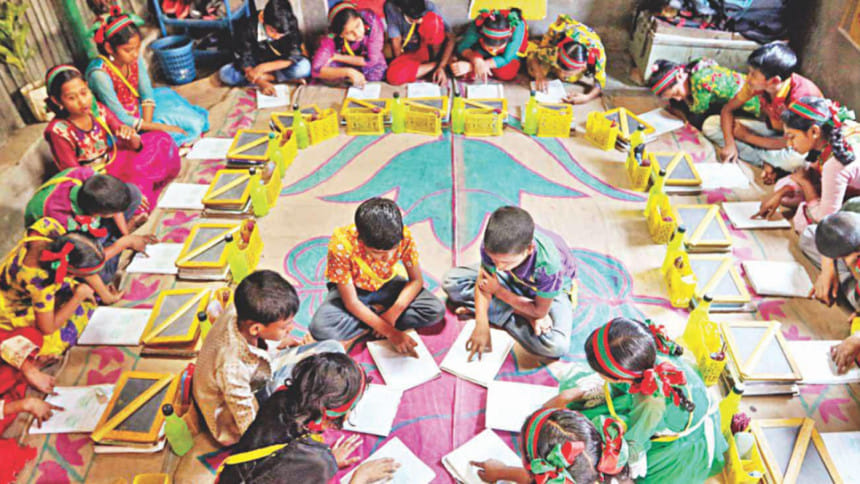Can it be the beginning of a ‘decade of education’ plan?

In the run-up to preparing the budget for the financial year 2019-2020, consultations are being held, like in the previous years, by the finance minister and his senior colleagues with various stakeholders. As part of this dialogue, civil society bodies, especially the Campaign for Popular Education (CAMPE), have been putting forth their expectations regarding a greater priority to education and better use of resources. In recent years, these pleas have not made a significant difference.
Public spending in education has remained stuck around 2 percent of GDP, although the absolute amount of allocation has grown. In priority-setting and use of resources, no significant change can be reported. Will the upcoming budget be any different? As the first budget since the parliamentary election and the regime's mandate for another five years of rule, can this budget mark the beginning of a decade-long plan for educational transformation?
The 2018 Awami League election manifesto promised, among other things, the highest allocation for education and its proper use; all-out efforts to improve the standard of education; banishing the curse of illiteracy; expansion of school feeding; investment in technical education and ICT to make education from school to university befitting the 21st century; a youth training centre in every upazila; and girl-boy ratio in higher education raised by 2020 to 100 percent from the current 70 percent. This is a good agenda for a decade plan, if effective implementation follows.
As part of the "Critical Conversation" on Bangladesh's journey beyond LDC, organised by the Bangladesh Institute of Development Studies (BIDS) on April 28-29, a session was held on the education challenges. In the session, Minhaj Mahmud, BIDS senior researcher, cited comparative economic analysis pointing out the need for improving "factor productivity" for labour by eight times in the next decade. This means, in plain language, a major enhancement of skills and competencies of students at different levels of education.
Prof Rehman Sobhan, Chairperson of the Centre for Policy Dialogue (CPD), speaking about industrial policy in the BIDS seminar, asserted that "democratisation of education and creating equal opportunity for quality education need to be the central agenda for the journey from LDC to a Middle-Income Country."
The Sustainable Development Goals (SDG), especially goal 4 on education, to which Bangladesh is committed, is an opportunity to address various challenges in education and necessary re-thinking regarding action priorities by 2030 focusing on the immediate future and beyond. The commitment of Bangladesh government, as reflected in various documents about vision and plan—the Seventh Five Year Plan 2016-20 (7FYP), Vision 2021, the Perspective Plan 2010-2021—needs to be critically examined from the SDG perspective.
It is time to underscore the crucial task of taking up the agenda for addressing the quality deficits in education. It is human capability and human agency that can help achieve the national aspirations and the sustainable development goals for 2030. It cannot be gainsaid that failures in education hold the nation's future in hostage.
The new budget cannot be the full answer to the deep-rooted problems of education and development. But it can at least help set a course for change, leaving existing patterns and practices intact.
In the memorandum to the minister of finance, CAMPE, reflecting a range of views of its broad civil society constituency, highlighted a few key questions:
Firstly, can the new budget clearly demonstrate the beginning of steps to fulfil the political pledges? Can it mark the beginning of a 10-year programme ("a decade of education") to fulfil the SDG commitment of inclusive, equitable and quality education for all from preschool to secondary level and lifelong learning opportunities for youth and adults? Unfortunately, no such comprehensive programme exists now other than one only for primary education up to grade 5.
Secondly, as part of the ten-year plan, can there be a programme of quality improvement of school education with new thinking and action to bring "the best and the brightest" into the teaching profession? Such a plan would include introduction of education and teaching certification as part of the four-year general college degree course (with assurance of quality and good management), as done in many countries, and setting up of a National Teaching Service Corps with high status, remuneration and a career path.
Then, can the budget mark the beginning of an upazila-based planning and management of basic education (pre-primary, primary, secondary, vocational and literacy/adult education)? This may begin with piloting in one upazila in each division as a precursor to a countrywide move in the next ten years.
The annual national budget is not the main vehicle for reforms in the education system. But it can signal a change in direction. It has to be more than an expression of intent. It has to be followed up with serious policy and strategy support from the top.
Dr Manzoor Ahmed is professor emeritus at BRAC University.

 For all latest news, follow The Daily Star's Google News channel.
For all latest news, follow The Daily Star's Google News channel. 



Comments